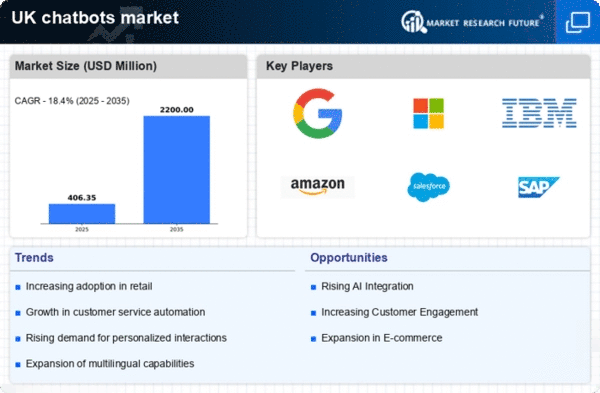Growing Focus on Personalisation
The chatbots market in the UK is witnessing a growing focus on personalisation as businesses aim to create tailored experiences for their customers. Personalised interactions are becoming increasingly important in fostering customer loyalty and satisfaction. Data indicates that 80% of consumers are more likely to make a purchase when brands offer personalised experiences. Chatbots are being designed to utilise customer data effectively, allowing them to provide recommendations and support that align with individual preferences. This trend is likely to drive the adoption of chatbots across various sectors, including retail and hospitality, where personalised service is paramount. As companies strive to differentiate themselves in a competitive landscape, the ability of chatbots to deliver customised interactions may prove to be a key driver of growth in the chatbots market.
Increased Investment in AI Technologies
Investment in artificial intelligence (AI) technologies is significantly influencing the chatbots market in the UK. As businesses recognise the potential of AI to enhance operational efficiency and customer engagement, funding for chatbot development is on the rise. Recent statistics suggest that the AI market in the UK is projected to reach £15 billion by 2025, with a substantial portion allocated to chatbot technologies. This influx of investment is likely to accelerate innovation and improve the capabilities of chatbots, making them more effective in addressing customer needs. Furthermore, as AI technologies continue to evolve, the chatbots market is expected to benefit from enhanced functionalities, such as predictive analytics and advanced decision-making capabilities. This trend indicates a robust future for chatbots as integral tools in business operations.
Expansion of Multi-Channel Communication
The expansion of multi-channel communication is emerging as a significant driver for the chatbots market in the UK. Businesses are increasingly adopting chatbots to facilitate seamless interactions across various platforms, including social media, websites, and messaging apps. This trend reflects the changing preferences of consumers, who expect consistent and accessible communication channels. Data shows that 75% of customers prefer to engage with brands through multiple channels, highlighting the necessity for businesses to adapt. By integrating chatbots into their communication strategies, companies can ensure that they meet customer expectations while enhancing their operational efficiency. This multi-channel approach is likely to propel the growth of the chatbots market, as businesses seek to provide a cohesive and responsive customer experience.
Advancements in Natural Language Processing
Technological advancements in natural language processing (NLP) are playing a crucial role in the evolution of the chatbots market in the UK. Enhanced NLP capabilities enable chatbots to understand and respond to customer queries with greater accuracy and relevance. This improvement is likely to lead to increased user satisfaction and engagement. As of November 2025, it is estimated that around 60% of chatbots in the UK are equipped with advanced NLP features, allowing for more human-like interactions. The integration of machine learning algorithms further enhances the ability of chatbots to learn from past interactions, thereby improving their performance over time. Consequently, businesses are more inclined to invest in chatbot technology, recognising its potential to streamline communication and enhance customer experiences. This trend suggests that the chatbots market will continue to expand as companies seek to leverage these technological advancements.
Rising Demand for Customer Support Automation
The chatbots market in the UK is experiencing a notable surge in demand for customer support automation. Businesses are increasingly recognising the efficiency and cost-effectiveness of deploying chatbots to handle customer inquiries. According to recent data, approximately 70% of customer interactions are expected to be managed by chatbots by 2025. This shift is driven by the need for 24/7 availability and the ability to handle multiple queries simultaneously. As companies strive to enhance customer satisfaction while reducing operational costs, the chatbots market is likely to see substantial growth. The automation of routine tasks allows human agents to focus on more complex issues, thereby improving overall service quality. This trend indicates a significant transformation in how businesses engage with their customers, positioning chatbots as a vital component of modern customer service strategies.
















